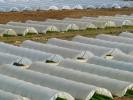HORIZON EUROPA REVALUE-PG Project: Extractive expansion and anti-systemic environmentalism: A socio-ecological class perspective on post-growth policies and nature revaluation
- Type Project
- Status Signed
- Execution 2025 -2027
- Assigned Budget 181.152,96 €
- Scope Europeo
- Autonomous community Cataluña
- Main source of financing Horizon Europe 2021-2027
- Project website https://doi.org/10.3030/101149972
In a growth-driven world, the expansion of extractive industries is a pressing challenge. The growing need for resources creates a global expansion of rural and natural ecosystems, triggering socio-ecological disruptions. This translates into the devaluation of nature, both culturally and ecologically.
Supported by the Marie Skłodowska-Curie Actions (MSCA) program, the REVALUE-PG project will shed light on the intricate web linking global extractivism, socio-ecological justice movements, and the imperative of a post-growth transition. By merging disciplines such as historical sociology and ecological economics, REVALUE-PG aims to chart a course toward a post-growth transition rooted in socio-ecological rationality.
REVALUE-PG seeks to explore the historical relationship between global extractivism, socio-ecological transformation, agrarian and environmental justice movements, and the politics of post-growth transition by integrating conceptual and methodological approaches to development studies and environmental studies, particularly the fields of historical sociology and the political economy of development, ecological economics, and political ecology. The growth of the social metabolism of the global economy has generated a global extractive expansion into rural-natural ecosystems through the formation of extractive commodity frontiers.
A central hypothesis is that the current economic rationale for growth, based on capital accumulation, facilitates the commodification of nature, leading to its sociocultural and ecological devaluation. The purpose of this project is to understand how global extractivism generates a politics of socio-environmental movements that operate as anti-systemic social forces demanding alternative social forms and practices to organize and regulate social metabolism and the social relations of (re)production and, therefore, to configure underlying frameworks for a systemic transition to post-growth.
By exploring anti-systemic environmentalism, it proposes a socio-ecological understanding of class and seeks to further explain the class dynamics at play in socio-environmental conflicts and politics by challenging and politicizing capitalist relations of extraction. It seeks to explore how the post-growth transition requires a political-economic revaluation of nature beyond its commodity form, based on socio-ecological rationality. REVALUE-PG focuses on the geographical location of Turkey to conduct a thorough empirical investigation, given that Turkey has recently exposed the links between extractive expansion in rural areas, one of the pillars of national economic growth policy, and the expansion of the political field of environmental justice.
- UNIVERSITAT AUTONOMA DE BARCELONA







